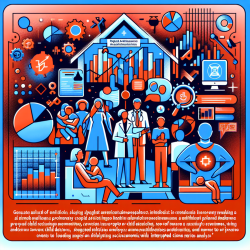Introduction
In the ever-evolving landscape of public health, the intersection of policy and socioeconomic factors offers a fertile ground for research and practice improvement. A recent study titled "Interrupted time series analyses to assess the impact of alcohol control policy on socioeconomic inequalities in mortality in Lithuania: a study protocol" provides a compelling case study. This research offers insights that can be adapted to various fields, including speech-language pathology, to enhance outcomes for children and communities.
Understanding the Research
The study conducted in Lithuania examines the impact of alcohol control policies, specifically the 2017 increase in alcohol excise taxes, on socioeconomic inequalities in mortality. By using interrupted time series analyses, the researchers aim to understand whether these policies have reduced mortality inequalities across different socioeconomic groups.
Key findings suggest that the increase in alcohol excise taxes has the potential to reduce mortality rates, particularly in lower socioeconomic groups. This is significant because it highlights the role of policy in addressing health disparities, which is a crucial consideration for practitioners across various fields.
Implications for Practitioners
While the study is centered on alcohol policy and mortality, the methodology and outcomes offer valuable lessons for speech-language pathologists and other practitioners:
- Data-Driven Decisions: The use of interrupted time series analyses underscores the importance of robust data analysis in evaluating policy impacts. Practitioners can adopt similar analytical approaches to assess the effectiveness of interventions in their practice.
- Addressing Inequalities: The study highlights the role of policy in reducing inequalities. Practitioners should consider how socioeconomic factors impact access to and outcomes of therapy services, and advocate for policies that promote equity.
- Interdisciplinary Collaboration: The research demonstrates the value of collaboration across disciplines. Speech-language pathologists can benefit from engaging with public health and policy experts to address broader determinants of health.
Encouraging Further Research
The study's findings open the door for further research into the impact of policy on health outcomes. Practitioners are encouraged to explore how similar methodologies can be applied to their field, particularly in understanding how socioeconomic factors influence therapy outcomes for children.
For those interested in delving deeper into the original research, the full study is available for review. Interrupted time series analyses to assess the impact of alcohol control policy on socioeconomic inequalities in mortality in Lithuania: a study protocol.
Conclusion
By leveraging the insights from this study, practitioners can enhance their understanding of how policy influences health outcomes and apply these lessons to improve services for children. The intersection of data, policy, and practice offers a powerful framework for driving positive change in the field of speech-language pathology.










